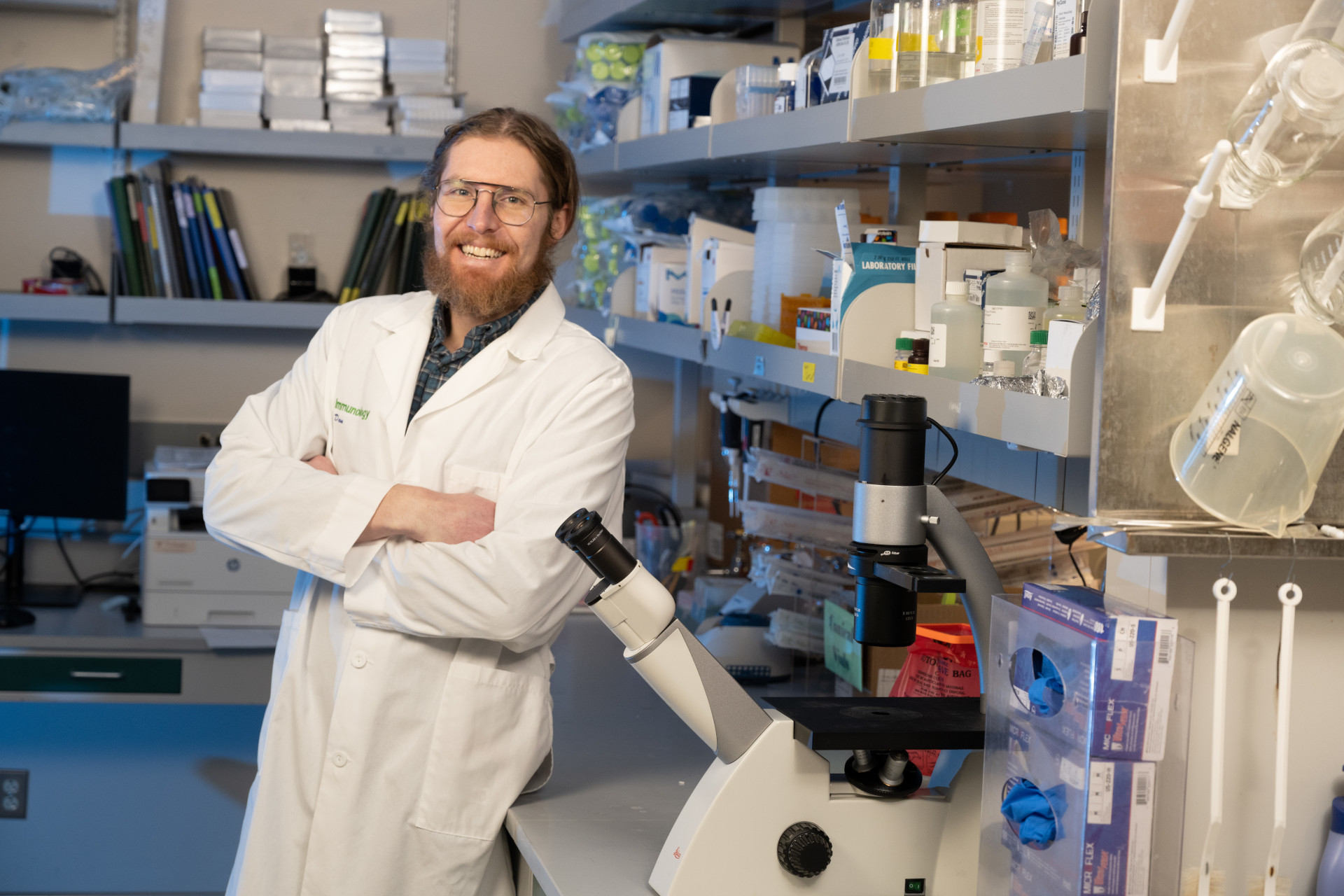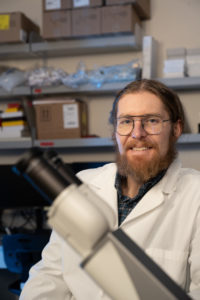
Driven by curiosity and care, Dr. Dan Regan’s translational work and collaboration within the College of Veterinary Medicine and Biomedical Sciences and broader field of comparative oncology research earned him the 2022 Zoetis Award for Veterinary Research Excellence.
A pathologist and assistant professor in the Department of Microbiology, Immunology, and Pathology, his initial osteosarcoma research progressed a therapeutic combination from novel canine models to human clinical trials at the Children’s Hospital Colorado and Children’s Healthcare Atlanta. Regan is also director of the Investigational Pathology Laboratory at the Flint Animal Cancer Center, a role that allows him to contribute his pathology expertise through a team science approach to a variety of translational animal models of disease.
As the Zoetis awardee, Regan will deliver the keynote talk at the upcoming College of Veterinary Medicine and Biomedical Sciences Research Day on Jan. 28, titled “Everything I know I learned from dogs: A comparative metastasis biology approach to accelerate development of tumor microenvironment targeted immunotherapies for osteosarcoma.”
Learning from dogs
In recognition of his 2022 Zoetis Award for Veterinary Research Excellence, Dr. Dan Regan will kick off the 24th annual College of Veterinary Medicine and Biomedical Sciences Research Day with a keynote address on Saturday, Jan. 28 at the Lory Student Center. He’ll talk about his translational approach to osteosarcoma research.
Dan, the almost weatherman
Collecting turtles, snakes, and “anything [he] could find” as a child on Saint Simons Island off the southern coast of Georgia served as a formative start to Regan’s journey to becoming a veterinarian.
After moving to Ohio, the anticipation of his first snow and a certain skiing weatherman, Herb Stevens, inspired an additional interest in weather and winter activities.
“By the time I hit high school, I was like, ‘yeah, I’m just not smart enough to be a veterinarian,’ but I’m going to get a Ph.D. and be a winter weather specialist,” Regan said.
Drawn to the University of Georgia by family and a reputable meteorology program, Regan instead rediscovered his desire to become a veterinarian during his first year, prompting him to change his major from meteorology to biology.
Regan developed a passion for the mechanisms of disease in veterinary school and a unique opportunity in an ophthalmology course funded his first-ever research. Initially drawn to research immunology by a family history of autoimmune diseases, his father’s cancer diagnosis cemented Regan’s research interests.
One Nature paper “blew his mind” at the time, demonstrating a tumor could signal immune cells to visit and prepare future sites of metastasis in the body prior to the tumor’s arrival, like preparing the soil for the seeds of cancer.
Regan was intent on further pursuing this paradigm, known as the “pre-metastatic niche,” when he began the Anatomic Pathology Residency and Ph.D. program at Colorado State University in 2011.
Committing to cancer research
“I just thought osteosarcoma was the perfect model,” Regan said. “It has this extreme propensity to metastasize to the lungs.”
Luckily, his primary advisor, Dr. Steve Dow, agreed. Both veterinarians and pathologists, they were uniquely equipped to investigate this type of bone cancer more prevalent in dogs.
In humans, osteosarcoma is a rare yet primarily pediatric disease, with little improvement in therapeutic outcomes in recent decades. Over a third of patients still develop recurrent disease, almost exclusively in the lungs, within an average 1.6 years of initial treatment.
Using a canine model, Dow and Regan’s initial research focused on targeting monocytes, which tumor cells convert to macrophages and progress metastasis. A resulting clinical trial for dogs with a drug combination aimed at these monocytes successfully advanced to a human clinical trial, underscoring the value of the canine model to rapidly deploy potential therapeutics.
Now, as a CSU faculty member with his own lab, Regan takes a highly collaborative and multi-pronged approach to understanding different cell types and mechanisms involved in the tumor microenvironment and metastatic seeding. With his lab members, Regan is investigating exosomes released by tumors that arrive at the lung first and possibly signal for additional arrivals, such as tumor macrophages that influence changes to residential macrophages in the lung. The presence of these macrophages could provide a potential diagnostic method for patient monitoring, using a bronchoalveolar lavage to wash fluid through the lungs and analyze the present cell types.
Additionally, responding to the signals, fibroblasts in the lung are thought to trigger the overall transformation of the soil of the lungs and recruit additional tumor-promoting cells.
“Understanding these mechanisms of priming this soil might lead to something that you can monitor to predict who would relapse and why,” Regan said.
The early success and further potential of his translational osteosarcoma research was recognized and supported with several honors, including a Boettcher Foundation Webb-Warring Biomedical Research Award in 2020. Regan was also recently awarded an Outsmarting Osteosarcoma grant by the Making It Better Agents, a nonprofit organization that brings together the small community of patients, caregivers, doctors, and researchers to prompt awareness and developments for pediatric osteosarcoma.
As one of the few veterinarians involved, Regan had the chance to meet and hear the stories of “osteo-warriors” and their families. He carries those personal connections with him to the lab bench.
“I would love to make a difference for some of these patients. They have their efforts to fight, but they’ve been through a lot of stuff; it’s tough therapy,” Regan said. “Once this tumor recurs, it would be great to make a difference there.”
Giving back with gratitude

Many people along the way have been instrumental in Regan’s education and career.
“The academic community to me was where, for the first time in my life, I felt accepted and could be myself,” Regan said.
Early on, mentors helped him navigate the process of college, train in research, and apply for a residency program, setting him on his current path. He values the opportunity to give back and ignite a similar spark in students, through teaching, offering research experience in his lab, and his leadership of the D.V.M./Ph.D. Combined Degree Program.
Regan can continue to move ideas from the lab, thanks to his proximity to other translational scientists, clinical staff, dedicated pet owners, and growing connections to fellow osteosarcoma researchers and oncologists beyond the university.
Receiving the news of his selection for the 2022 Zoetis Award for Veterinary Research Excellence is motivating for his efforts to make a difference for people and pets, through ups and downs.
“Honestly, I’m just grateful for the opportunity to do this as a career and maybe help somebody,” Regan said.